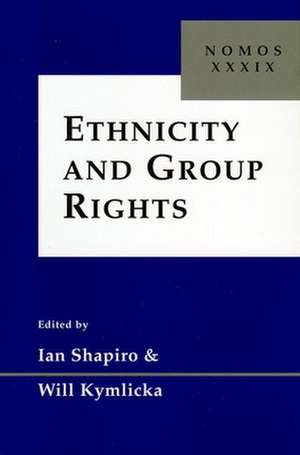Ethnicity and Group Rights – Nomos XXXIX
Autor Ian Shapiro, Will Kymlickaen Limba Engleză Hardback – 28 feb 1997
Preț: 560.90 lei
Preț vechi: 659.88 lei
-15% Nou
Puncte Express: 841
Preț estimativ în valută:
107.33€ • 112.38$ • 89.02£
107.33€ • 112.38$ • 89.02£
Carte indisponibilă temporar
Doresc să fiu notificat când acest titlu va fi disponibil:
Se trimite...
Preluare comenzi: 021 569.72.76
Specificații
ISBN-13: 9780814780626
ISBN-10: 0814780628
Pagini: 643
Dimensiuni: 144 x 215 x 45 mm
Greutate: 0.98 kg
Ediția:New.
Editura: MI – New York University
ISBN-10: 0814780628
Pagini: 643
Dimensiuni: 144 x 215 x 45 mm
Greutate: 0.98 kg
Ediția:New.
Editura: MI – New York University
Textul de pe ultima copertă
Within Western political philosophy, the rights of groups have often been neglected or addressed in only the narrowest fashion. Focusing solely on whether rights are exercised by individuals or groups misses what lies at the heart of ethnocultural conflict, leaving central questions unanswered: Can the familiar system of common citizenship rights within liberal democracies sufficiently accomodate the legitimate interests of "ethnic" citizens? How does membership in an ethnic group differ from other groups, such as professional, lifestyle, or advocacy groups? How important is ethnicity to personal identity and self-respect, and does accomodating these interests require more than standard citizenship rights? Perhaps most important, what forms of ethnocultural accomodations are consistent with democratic equality, individual freedom, and political stability? Invoking numerous case studies and addressing the issue of ethnicity from a range of perspectives, Ethnicity and Group Rights seeks to answer these questions.
